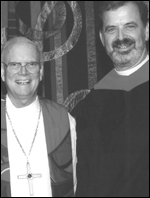 |
| H. George Anderson with Mark R. Ramseth. |
Lord, to whom shall we go? You have the words of eternal life (John 6:68).
Last Wednesday I was in New York City. I was there to meet with members of the Metropolitan New York Synod and some members from the adjoining synods who were directly involved in dealing with the human damage done by the destruction of the World Trade Center. As an introduction to the situation, I was taken on a foot tour around “ground zero,” as it has come to be called.
The destruction was bad enough; you have seen it from all angles on TV. What I wasn’t prepared for was the effect this tragedy is having on the people who are working there, day and night. Their protective gear is hot and heavy, their task is worse than grim, their hours are interminable. Many of them are far from home. I talked to emergency team members from Los Angeles. As they come off the pile for a break, they sit heavily in chairs or propped up against walls. And they just stare straight ahead, maybe because they are too exhausted to move, maybe because their minds are running recaps of what they have just seen and done.
Not exactly an expectant congregation! Yet when I would go over and speak to one of them, his face would come alive, and—to my embarrassment—he would inevitably stand, and almost at once we were talking about the great questions: good and evil, life and death, justice and revenge. It was as if the sight of my collar released all those questions that had accumulated but had no natural channel to express themselves. “Lord, to whom shall we go? You have the words of eternal life.”
I don’t know whether I contributed anything to their lives, but they have left a precious gift with me. As I thought about their faces afterward, I recalled a fresco by Piero della Francesca depicting the resurrected Christ. From a distance the composition of the fresco is clearly triumphant. Soldiers lie sprawled in the foreground. The risen Christ steps out of the sepulcher, one foot resting on its lid; a banner of victory in one hand forms the apex of the composition. But as you get closer, you notice Christ’s eyes—hollow, weary, staring as though they are running recaps of what he has just seen and done. This is truly the face of God, who has overcome evil—not by crushing it, but by enduring it and outliving it.
People wondered what part God had in the events of September eleventh. God was there doing what Christ showed us God always does—reversing the effects of human sin. That’s what the cross was all about; bringing good from evil. And then I realized that all the workers I had seen at “ground zero” were firemen, not demolition workers. They were there determined to find survivors—their brothers or anyone else. They were committed to bringing life—or at least healing and closure—out of that twisted wreckage. A symbol of God’s work for us all.
This catastrophe has scratched through the teflon coating of secularism on our society and has eaten into the core of people’s lives. The old litanies of avoidance—“Have a good day,” “no problem,” and “whatever”—don’t work any more. They don’t feed the aching soul. The idols have once again proven impotent and mute.
This crisis has reminded us that there are issues of human life beyond the reach of ordinary discourse, and these issues are around, crisis or not.
We need words of eternal life—words that are good for us, whether we want to hear them or not. We won’t get them for CBS or CNN. We can’t suck them out of our own thumbs, as one of my professors used to say. We can’t always get them out of the Bible by ourselves, because we read that Bible with our own personal presuppositions. We need to hear the Word from outside, proclaimed to us in honesty and love.
And that is why we are all here. That is the job of theological education. To seek that Word in honesty and love and then to share that Word in honesty and love. All the disciplines that cluster around a seminary curriculum are designed to hear that Word clearly, to speak it effectively, and to incarnate it authentically—musically, visually, personally, socially—insofar as that is possible for earthen vessels.
Excerpted from a sermon preached by Evangelical Lutheran Church in America Presiding Bishop H. George Anderson, September 23, 2001, at the installation of the Reverend Mark R. Ramseth as president of Trinity Lutheran Seminary in Columbus, Ohio.